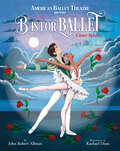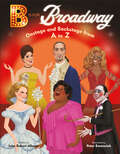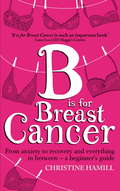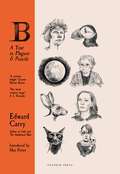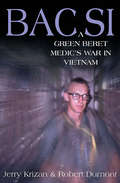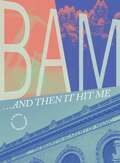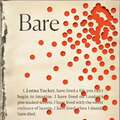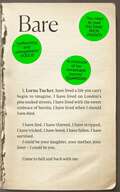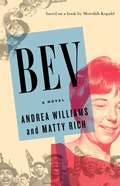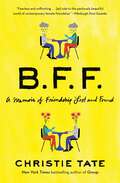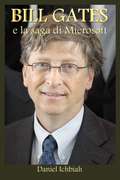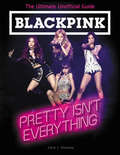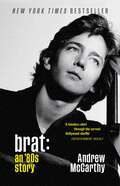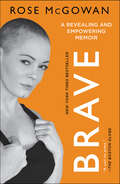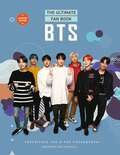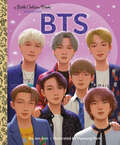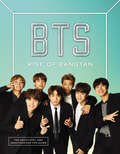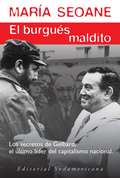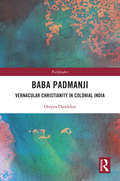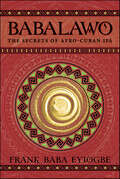- Table View
- List View
B Is for Ballet: A Dance Alphabet (American Ballet Theatre)
by John Robert AllmanAn A to Z celebration of the world of ballet, from the renowned American Ballet Theatre.A is for arabesque, B is for Baryshnikov, and C is for Coppélia in this beautifully illustrated, rhyming, alphabetic picture book, filled with ballet stars, dances, positions, and terminology. Written by the acclaimed author of A Is for Audra: Broadway's Leading Ladies from A to Z, the dazzling, creative wordplay forms a graceful pas de deux with the stylish, swooping lines and rich color of the sumptuous illustrations. In partnership with the American Ballet Theatre, here is the perfect gift for any ballet fan, from children just starting ballet to adults who avidly follow this graceful artform.
B Is for Broadway: Onstage and Backstage from A to Z
by John Robert Allman&“A must-have for all Broadway lovers—B Is for Broadway—a book I am actually in!!! I am buying a dozen.&” —ROSIE O&’DONNELL, Isabelle Stevenson Award recipient, three-time Tony Awards host, and Emmy Award winnerNew from the creators of A Is for Audra: Broadway's Leading Ladies from A to Z! From AUDITIONS to ZIEGFELD, grab a ticket to this smash-hit, rhythmic alphabet book featuring your favorite performers, creators, songs, and shows from the Broadway stage!Step into the spotlight and celebrate a cavalcade of Broadway legends! Start with "A" for "audition" with the iconic line-up from A Chorus Line, then peek behind "B" to see the "backstage" buzz, and dance along with "C" for "choreographers".Children and grown-ups alike can spot beloved stars and creators from today and yesterday, such as Lin-Manuel Miranda, Patti LuPone, Michael Bennett, Jennifer Holliday, Ethel Merman, and Billy Porter. Readers will also see famous New York theaters, beloved shows such as Hamilton and Hairspray, and the crew, stylists, and technicians who are vital to each performance. It's a celebration of the American stage that no fan is going to want to miss.A portion of the proceeds from the sale of this book is donated to The Actors Fund.&“We are honored that a portion of the proceeds of author John Robert Allman and illustrator Peter Emmerich&’s B is For Broadway will go to support our programs. The Actors Fund is proud to be at the forefront of helping everyone in the entertainment community with emergency financial assistance and supportive services, and we&’re grateful that this wonderful new work will help those in need in our performing arts community.&” —Joseph P. Benincasa, President & CEO, The Actors FundB Is for Broadway is a hit with the stage's greatest stars!&“B Is for Broadway celebrates the entire Broadway community—backstage, onstage, everyone! who works in our performing arts and entertainment community. I&’m honored to be a part of that beautiful community, and this lovely book.&” —BEBE NEUWIRTH, Tony and Emmy Award–winning dancer, singer, actress (Sweet Charity, Chicago, Cheers), and Vice Chair of The Actors Fund &“E is for excited, which is what I am to be included in this book to benefit the incredible work of The Actors Fund.&” —BRIAN STOKES MITCHELL, Tony Award–winning actor and Board Chair of The Actors Fund &“The illustrations—gorgeous. The rhymes—delicious. This book—a must-have! B is for Broadway and buy-it-now!&” —KRISTIN CHENOWETH, Tony Award–winning actress (You&’re a Good Man, Charlie Brown) &“What a dynamite willkommen to the world of Broadway!&” —JOEL GREY, Tony Award and Oscar–winning actor (Cabaret) &“B Is for Broadway is a gorgeous children&’s book that will introduce a young person to all the magic of theater!&” —ALI STROKER, Tony Award–winning actress (Oklahoma!)
B is for Breast Cancer: From anxiety to recovery and everything in between - a beginner's guide
by Christine Hamill'The day after I was diagnosed with breast cancer, I was standing in the chemist with a basket in my hand, blinking back tears and thinking, "Now what does a breast cancer patient need?" All I could come up with was waterproof mascara. I put some in my basket and thought someone should write an alternative guide to breast cancer. Step one - buy waterproof mascara. You're going to need it. A few short months later, I found I was writing the guide myself. I sat in bed in between hospital appointments with my laptop, furiously, desperately trying to make sense of this alien world I had entered.'Written entirely while Christine Hamill was undergoing cancer treatment, this book is an honest and frank account of the emotional and physical impact of a cancer diagnosis. It is at turns funny, sad, angry and ultimately optimistic. Written without sentimentality, B is for Breast Cancer offers bite-size chunks of help and hope - a daily pep talk to anyone affected by the disease. It's packed full of the practical information that you really need.Read this book. It helps to know you are not alone.
B. Puttaswamayya
by Shankar Mokashi-PunekarOn the works of B. Puototasvaamayya, b. 1897, Kannada author.
B: A Year in Plagues and Pencils
by Edward CareyAuthor and illustrator Edward Carey presents a paean to connection at a time of isolation: a year of daily lockdown drawings posted on social media from his home in Texas.In March 2020, as lockdowns were imposed around the world, author and illustrator Edward Carey published a sketch on social media with a plan to keep posting a drawing a day from his family home in Austin, Texas, until life returned to normal. One hundred and fifty pencil stubs later, he was still drawing.Carey's hand moved with world events, chronicling pandemic and politics. It reached into the past, taking inspiration from history, and escaped grim reality through flights of vivid imagination and studies of the natural world. The drawings became a way of charting time, of moving forward, and maintaining connection at a time of isolation.This remarkable collection of words and drawings from the acclaimed author of Little and The Swallowed Man charts a tumultuous year in pencil, finding beauty amid the horror of extraordinary times.
BAC SI: A Green Beret Medic's War in Vietnam
by Robert Dumont Jerry KrizanA Special Forces medic delivers &“a fascinating account of an unfamiliar part of the Vietnamese War, written in a compelling style&” (History Of War). During the Vietnam War, US Army Special Forces A-Teams were deployed to isolated outposts or &“camps&” in the remote areas of South Vietnam. Their job was to recruit, train, and house members of the indigenous population while molding them into combat-ready fighting units. A-Teams consisted of up to twelve Green Beret soldiers who were experts in both combat and their individual military specialties.Bac Si, the Vietnamese term for &“medic,&” is the story of Sgt. Jerry Krizan, who was assigned to Special Forces Camp A-331 in the III Corps tactical zone, only ten miles from the Cambodian border. Because of its proximity to a major north-south North Vietnamese Army infiltration route, there were constant enemy troop movements through the camp&’s area of operations and A-331 itself came under attack on more than one occasion. The author accompanied patrols and probes into enemy territory, not only prepared to provide aid but fight as a soldier if the squad was ambushed or chose to attack. In this small-unit warfare against an expert enemy, US soldiers had to survive as best they could, with their only succor a Huey—meantime, on the ground, by themselves against unknown opposition. Our Green Beret base camps were our very first line of defense along the borders of South Vietnam, and in this book, through the eyes of a medic, we learn how dire, and confusing, a role we asked our Special Forces to play during that era.
BAM... and Then It Hit Me
by Karen Brooks HopkinsPresident Emerita of the Brooklyn Academy of Music (BAM) Karen Brooks Hopkins pens BAM…and Then It Hit Me, an inspiring memoir of her 36 years at the iconic cultural institution, America's oldest performing arts center. The book has a sharp focus on concepts such as leadership, innovation, urban revitalization (including the transformation of Brooklyn from Manhattan Outpost to the coolest neighborhood on the planet), as highly successful cultural fundraising played critical roles in the colorful evolution of this world-class cultural juggernaut in the performing arts.
BARE: 'You have to read this book' MICK JAGGER
by Lorna TuckerThe inspirational true story of one woman's fight to survive on the streets of LondonI, Lorna Tucker, have lived a life that most you can't even begin to imagine...'You need to read this book' MICK JAGGER'Unflinching and unforgettable' VOGUE 'An essential read showcasing the resilience of the human spirit' JUANO DIAZI have lived in London's piss-soaked streets, I have lived with the sweet embrace of heroin, I have lived when I should have died.I have lied, I have thieved, I have stripped, I have tricked, I have loved, I have fallen, I have survived. I could be your daughter, your mother, your lover - I could be you.Come to hell and back with me.AN EYE-OPENING, PERSONAL ACCOUNT OF FEMALE HOMELESSNESS, FROM ONE OF BRITAIN'S MOST EXCITING FILM-MAKERS
BARE: 'You have to read this book' MICK JAGGER
by Lorna TuckerThe inspirational true story of one woman's fight to survive on the streets of LondonI, Lorna Tucker, have lived a life that most you can't even begin to imagine...'You need to read this book' MICK JAGGER'Unflinching and unforgettable' VOGUE 'An essential read showcasing the resilience of the human spirit' JUANO DIAZI have lived in London's piss-soaked streets, I have lived with the sweet embrace of heroin, I have lived when I should have died.I have lied, I have thieved, I have stripped, I have tricked, I have loved, I have fallen, I have survived. I could be your daughter, your mother, your lover - I could be you.Come to hell and back with me.AN EYE-OPENING, PERSONAL ACCOUNT OF FEMALE HOMELESSNESS, FROM ONE OF BRITAIN'S MOST EXCITING FILM-MAKERS
BARE: 'You have to read this book' MICK JAGGER
by Lorna TuckerThe inspirational true story of one woman's fight to survive on the streets of LondonI, Lorna Tucker, have lived a life that most you can't even begin to imagine...'You need to read this book' MICK JAGGER'Unflinching and unforgettable' VOGUE 'An essential read showcasing the resilience of the human spirit' JUANO DIAZI have lived in London's piss-soaked streets, I have lived with the sweet embrace of heroin, I have lived when I should have died.I have lied, I have thieved, I have stripped, I have tricked, I have loved, I have fallen, I have survived. I could be your daughter, your mother, your lover - I could be you.Come to hell and back with me.AN EYE-OPENING, PERSONAL ACCOUNT OF FEMALE HOMELESSNESS, FROM ONE OF BRITAIN'S MOST EXCITING FILM-MAKERS
BEV: A Novel
by Andrea Williams Matty RichBased on the real life story of a little-known figure in the Civil Rights Movement: a white social worker who left the comforts of her life in New York City to travel to the segregated South, comes BEV, a fictionalized account of the strength, compassion, and dangers people faced in their fight to help African Americans achieve equality. After watching the horrifying images of dogs, hoses, and violence on March 7, 1965 aka Bloody Sunday, Bev Luther, a white Northerner, determined she could no longer afford to remain a spectator. As a social worker, she knew she was needed to help and march alongside African Americans, Asians, and Latinos in the quest for equality. Along with several other Northerners--mostly whites--she decided to travel down to the tense segregated South right in the middle of an era that would change America forever. With a clear understanding of history and evocative language, BEV is the fictionalized account of those who answered the call to help their fellow citizens earn the right to vote.
BFF: A Memoir of Friendship Lost and Found
by Christie Tate* &“A love story about the miracle of friendship.&” —Maggie Smith * &“Fearless and unflinching.&” —Pittsburgh Post-Gazette * From the author of Group, a New York Times bestseller and Reese&’s Book Club Pick, a poignant, funny, and emotionally satisfying memoir about Christie Tate&’s lifelong struggle to sustain female friendship, and the extraordinary friend who changed everything.After more than a decade of dead-end dates and dysfunctional relationships, Christie Tate has reclaimed her voice and settled down. Her days of agonizing in group therapy over guys who won&’t commit are over, the grueling emotional work required to attach to another person tucked neatly into the past. Or so she thought. Weeks after giddily sharing stories of her new boyfriend at Saturday morning recovery meetings, Christie receives a gift from a friend. Meredith, twenty years older and always impeccably accessorized, gives Christie a box of holiday-themed scarves as well as a gentle suggestion: maybe now is the perfect time to examine why friendships give her trouble. &“The work never ends, right?&” she says with a wink. Christie isn&’t so sure, but she soon realizes that the feeling of &“apartness&” that has plagued her since childhood isn&’t magically going away now that she&’s in a healthy romantic relationship. With Meredith by her side, she embarks on a brutally honest exploration of her friendships past and present, sorting through the ways that debilitating shame and jealousy have kept the lasting bonds she craves out of reach—and how she can overcome a history of letting go too soon. &“An outstanding portrait of self-excavation&” (Publishers Weekly, starred review), BFF explores what happens when we finally break the habits that impair our ability to connect with others, and the ways that one life—however messy and imperfect—can change another.
BILL GATES e la saga di Microsoft
by Daniel IchbiahPrima biografia realizzata su Bill Gates, questo libro è stato adattato e pubblicato in molti paesi del mondo : USA, Cina, Giappone, India, Corea del Sud, Israele, Ungheria… A lungo considerato un superdotato, un genio della tecnologia, Bill Gates è diventato l’uomo più ricco del mondo grazie ai suoi software. Negli anni 2000, è diventato filantropo, convinto di aver salvato milioni di vite, come ad esempio in Africa. È sempre al centro di mille controversie. Questo libro, aggiornato nel 2020, cerca di fare chiarezza e di fornire più informazioni possibili per far capire ciò che anima questa personalità fuori dal comune. Questo libro racconta la giovinezza di un superdotato chiamato Bill Gates che diventa campione di Informatica al liceo, la creazione del primo BASIC per microcomputer nel 1975 e poi la folle ascesa di Microsoft che renderà Bill Gates l’uomo più ricco del mondo. Seguiamo Gates attraverso mille peripezie : . Come può un ragazzo di 21 anni riuscire a convincere il gigante IBM a fare affari con lui ? . Il periodo difficile di Windows che dura 7 anni fino alla vittoria inattesa. . Com’è riuscito Gates ad imporsi alla maggior parte del pianeta, con un mix di genio e manovre monopolistiche discutibili. . Il processo intentato dal governo americano per abuso di posizione dominante… . Come Gates ha finalmente trovato in Google e Apple dei concorrenti in grado di uguagliare o superare Microsoft. . La sua progressiva riconversione nelle attività umanitarie stabilendo delle priorità che hanno sorpreso i suoi contemporanei. Questo libro è stato scritto da Daniel Ichbiah quando era giornalista specializzato di nuove tecnologie, ciò che gli ha consentito di incontrare regolarmente Bill Gates.
BLACKPINK: Pretty Isn't Everything - The Ultimate Unofficial Guide
by Cara StevensFilled with incredible color photos and fun facts, this unofficial fan guide tells the full story of the global phenomenon Blackpink. The girls of Blackpink are more than just pretty faces. Since they debuted in 2016, the group has broken record after record, played shows across the globe, and built up a dedicated fan army of BLINKS. Now they’re one of the biggest K-pop groups the world has ever seen. And they’re only just getting started.Read the whole story of Blackpink’s rise to fame in this extensively researched unofficial biography. Find out everything you need to know about Jennie, Jisoo, Lisa, and Rosé from their trainee days to their current lives as idols. Full of high-quality photos and fun facts, this unofficial guide is a must-have for all BLINKS and K-pop fans!
BRAT: An '80s Story
by Andrew McCarthyFans of Patti Smith's Just Kids and Rob Lowe's Stories I Only Tell My Friends will love this beautifully written, entertaining and bracingly honest memoir by an actor, director and author who found his start as a 1980s Hollywood Brat pack member. Most people know Andrew McCarthy from his roles in movies like Pretty in Pink and St Elmo's Fire, and as a charter member of Hollywood's Brat Pack. That iconic group of ingenues and heart throbs, including Rob Lowe, Molly Ringwald, Emilio Estevez and Demi Moore, has come to represent both a genre of film and an era of pop culture. In Brat, McCarthy focuses his gaze on that singular moment in time and the most defining moments of his youth. The result is a revealing look at coming of age in a maelstrom, reckoning with conflicted ambition, innocence, addiction and expectations of masculinity. New York City of the 1980s is brought to vivid life, from scoring joints in Washington Square Park to skipping school in favour of the dark revival houses of the Village where he fell in love with the movies that would change his life. Brat is at once an exclusive window into a defining period of pop-culture history and a surprising, intimate story of an outsider caught up in a most unwitting success. &‘Wit, wisdom, and a depth of honesty that resonates to your core&’ Demi Moore &‘Explores masculinity, success, the dangers of fame, ambition and cigarettes in an elegant and humorous coming of age story&’ Candace Bushnell &‘Absorbing, thoughtful, and sometimes painfully honest … a fascinating read&’ Jay McInerney &‘A riveting portrait of the artist as a young man&’ Publishers Weekly
BRAVE
by Rose McGowanNEW YORK TIMES BESTSELLER - A revealing memoir and empowering manifesto - As featured in Ronan Farrow's CATCH AND KILL and Jodi Kantor and Megan Twohey's SHE SAID"BRAVE works beautifully as a manifesto. It’s a call to arms—not just against the specific men who mistreated McGowan and the men and women who enabled that mistreatment, but against an industry."—The Boston GlobeRose McGowan was born in one cult and came of age in another, more visible cult: Hollywood.In a strange world where she was continually on display, stardom soon became a personal nightmare of constant exposure and sexualization. Rose escaped into the world of her mind, something she had done as a child, and into high-profile relationships. Every detail of her personal life became public, and the realities of an inherently sexist industry emerged with every script, role, public appearance, and magazine cover. The Hollywood machine packaged her as a sexualized bombshell, hijacking her image and identity and marketing them for profit.Hollywood expected Rose to be silent and cooperative and to stay the path. Instead, she rebelled and asserted her true identity and voice. She reemerged unscripted, courageous, victorious, angry, smart, fierce, unapologetic, controversial, and real as f*ck.BRAVEis her raw, honest, and poignant memoir/manifesto—a no-holds-barred, pull-no-punches account of the rise of a millennial icon, fearless activist, and unstoppable force for change who is determined to expose the truth about the entertainment industry, dismantle the concept of fame, shine a light on a multibillion-dollar business built on systemic misogyny, and empower people everywhere to wake up and be BRAVE. "My life, as you will read, has taken me from one cult to another. BRAVE is the story of how I fought my way out of these cults and reclaimed my life. I want to help you do the same." -Rose McGowan
BTS - The Ultimate Fan Book: Experience the K-Pop Phenomenon! (The Ultimate Fan Book)
by Malcolm CroftExperience the K-Pop phenomenon of BTS in this best-selling fanbook - FULLY UPDATED!BTS are much more than just a group of seven talented individuals, they are a band acclaimed for their record-smashing, barrier-breaking, trend-setting dance-pop and hip-hop tunes and personal philosophies. Featuring brand new content and sensational new photos, BTS: The Ultimate Fan Book includes everything you need to know about Jin, Suga, J-Hope, RM, Jimin, V and Jungkook, as well as the BTS ARMY.A celebration of the K-Pop phenomenon, exploring in stunning technicolour detail the group's origins, members and super rise to success, this Ultimate Fan Book is beautifully accompanied by photographs showcasing the band's kaleidoscope of personalities and passions that have made them famous. BTS are more than just a boy band - they are a way of life.
BTS - The Ultimate Fan Book: Experience the K-Pop Phenomenon! (The Ultimate Fan Book)
by Malcolm CroftExperience the K-Pop phenomenon of BTS in this best-selling fanbook - FULLY UPDATED!BTS are much more than just a group of seven talented individuals, they are a band acclaimed for their record-smashing, barrier-breaking, trend-setting dance-pop and hip-hop tunes and personal philosophies. Featuring brand new content and sensational new photos, BTS: The Ultimate Fan Book includes everything you need to know about Jin, Suga, J-Hope, RM, Jimin, V and Jungkook, as well as the BTS ARMY.A celebration of the K-Pop phenomenon, exploring in stunning technicolour detail the group's origins, members and super rise to success, this Ultimate Fan Book is beautifully accompanied by photographs showcasing the band's kaleidoscope of personalities and passions that have made them famous. BTS are more than just a boy band - they are a way of life.
BTS: A Little Golden Book Biography (Little Golden Book Biographies)
by Jan AnnGet to know BTS—the South Korean K-pop group loved by millions of fans around the world—with this beautifully illustrated collectible Little Golden Book!BTS&’s popularity has grown larger than anyone could have imagined.This boy bands' smash success story comes to life—from their early days together in South Korea, to becoming one of the biggest music groups in the world with hit songs like "Dynamite" and "Yet to Come," to speaking at the United Nations. When you&’re BTS, you work as a team, stay true to yourself, and inspire millions! This Little Golden Book Biography is perfect for BTS fans of all ages, the BTS ARMY, and people looking for inspiring stories about talented young musicians. Little Golden Book biographies feature the iconic gold-foil design and share the life stories of extraordinary artists, world leaders, performers, and athletes including:The BeatlesTaylor SwiftLady GagaHarry StylesThe Bee Gees
BTS: Rise of Bangtan
by Cara J. StevensA must-have for diehard ARMY members and new fans alike, this fan guide celebrates everything you love about BTS with an in-depth look at their journey (and ARMY’s role in it)—featuring tons of color photos! <P><P>This unofficial biography tells the story of BTS and their global ARMY, which helped propel them to the top of the charts all over the world. <P><P>Extensively researched, Rise of Bangtan explores the lives of RM, J-Hope, Suga, Jimin, V, Jin, and Jungkook, the story behind how they all got together, and their amazing rise to fame—from their start in East Asia to their dominance across the globe. If you love BTS and everything K-Pop, this celebration of your favorite band is what you’ve been waiting for.
BURGUES MALDITO, EL (EBOOK)
by M. Del SeoaneEn esta apasionante biografía, Maria Saone, autora de Todo o nada y de la noche de los lápices, cuenta la historia secreta de José Ver Gelbard, ultimo ministro de economía de Perón y el principal lobbista político de la Argentina en los años setenta. Gelbars, un inmigrante judío-polaco que no había terminado la escuela primaria, que había sido vendedor ambulante de corbatas, hojas de afeitar y preservativos en los olvidados pueblos del Norte, llego a ser el caudillo de los empresarios nacionales en una época en la que todavía había un gran proyecto del país. A través de la fascinante vida de este personaje excepcional, Seoane se interno en los recovecos de la historia de nuestro país para contar de manera decapada como se movían el poder económico y el poder político en años clave que determinarían el destino de los argentinos: los ambiciosos proyectos nacionales de los sesenta y el cruento fracaso de los setenta. Y al revelaron los secretos de la historia hasta ahora silenciada por un hombre fundamental, desnuda el mundo de los negocios de la burguesía, las prebendas, las alianzas espurias y el obstinado manejo del poder. Aquí aparecen desde David Gravier, los montoneros y Carlos Menem hasta Fate y Aluar, los Kennedy, Kissinger; Fidel Castro y Brezhnev, Perez Companc y Bunge (> )> Born. Durante 25 años José Ver Gelbard creyó fervorosamente en un proyecto nacional sin exclusiones, al mismo tiempo que concentraba un poder asombroso y se enriquecía manteniendo el perfil mas bajo, el modo perfecto para que su forma de hacer lobby fuera completamente eficaz. Con un ritmo vertiginoso se devela una trampa compleja y apasionante, donde el Creador de la Confederación General Económica - que aglutinaba pequeños y medianos empresarios- y el ministro de economía el mayor líder político del siglo XX muere en el destierro, perseguido y apartida porque los militares le quitaron la ciudadanía argentina, como a un burgués maldito. Hasta el día de hoy, su historia no fue contada.
Ba ane Bapu
by Mukul Kalarthiમારી સ્ત્રી પ્રત્યેનો મારો ભાવ હું વર્ણવી શકું તો હિંદુ ધર્મ પ્રત્યેનો મારો ભાવ વર્ણવી શકું. મારી સ્ત્રી મારા અંતરને જે રીતે હલાવે છે તે રીતે દુનિયાની બીજી કોઈ સ્ત્રી હલાવી શકે એમ નથી. એક અતૂટ મમતાના બંધનની ભાવના અહોરાત્ર મારા અંતરમાં જાગ્રત છે. —બાપુ મારા જેવો પતિ તો કોઈને દુનિયામાં પણ નહીં હોય. મારા પતિને લીધે તો હું આખા જગતમાં પૂજાઉં છું. —બા
Baba Padmanji: Vernacular Christianity in Colonial India (Pathfinders)
by Deepra DandekarThis book is a critical biography of Baba Padmanji (1831-1906), a firebrand native Christian missionary, ideologue, and litterateur from 19th-century Bombay Presidency. Though Padmanji was well-known, and a very influential figure among Christian converts, his contributions have received inadequate attention from the perspective of ‘social reform’ — an intellectual domain dominated by offshoots of the Brahmo Samaj movement, like the Prarthana Samaj in Bombay. This book constitutes an in-depth analysis of Padmanji’s relationships with questions of reform, education, modernity, feminism, and religion, that had wide-ranging repercussions on the intellectual horizon of 19th-century India. It presents Padmanji’s integrated writing persona and identity as a revolutionary pathfinder of his times who amalgamated and blended vernacular ideas of Christianity together with early feminism, modernity, and incipient nationalism. Drawing on a variety of primary and secondary sources, this unique book will be of great interest for area studies scholars (especially Maharashtra), and to researchers of modern India, engaged with the history of colonialism and missions, religion, global Christianity, South Asian intellectual history, and literature.
Babalawo: The Secrets of Afro-Cuban Ifá
by Frank Baba EyiogbeCuban Ifá From An InsiderHidden within the mysterious Afro-Cuban religion of Santería, also known as Lucumí, there is a deep body of secrets and rituals called Ifá. This book pulls away the veil of secrecy to reveal exactly what Ifá is and how it works, exploring its history, cosmology, Orichas, initiations, mythology, offerings, and sacrifices. Join Frank Baba Eyiogbe in this fascinating introduction that discusses the functions of the babalawo, the role of women, the future of Ifá, and much more.Praise: "A wonderful and much needed addition to the literature on Afro-Cuban religion. Engagingly written, scholarly while remaining accessible . . . it presents an up-to-date exposition of both the history and contemporary philosophy of one of the world's most complex systems of divination."mdash;Stephan Palmié, Chair of the Department of Anthropology and Social Sciences at the University of Chicago and author of The Cooking of History: How Not to Study Afro-Cuban Religion
Babar Ali's School (Fountas & Pinnell LLI Red #Level K)
by Anne O'Brien"Many kids want to be teachers one day. But how did one boy become a teacher at age nine?"-
